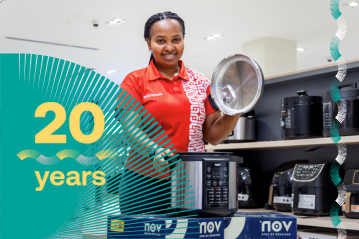Kenyans are bounding ahead in access to electricity, and electric cooking might be the perfect accompaniment. An electric pressure cooker or induction stove can connect the two sides of energy for development – electrification and clean cooking – under the banner of eCooking. But what kind of coordination does it take to make eCooking devices more than just gadgets? Starting when these technologies were virtually unknown in Kenya, EnDev helped the private sector make eCooking a real option. Then, Modern Energy Cooking Services (MECS) and EnDev helped the government fine-tune the recipe in a national cooking transition strategy.
Power to the kitchen
During EnDev’s two decades, the project made improved biomass cook stoves accessible to millions of Kenyans, cultivating a sustainable market for modern cooking. Between 2012 and 2022, however, something else developed in the country: the share of households with electricity shot up from 19% to 75%. Powered by geothermal and hydropower, the country became a rising renewable star with real potential to meet Sustainable Development Goal 7. The country was abuzz with experimentation, from mobile money – a Kenyan contribution to the world – to efficient electric cookers and business models supporting their adoption.
In 2021, EnDev acted on these developments with its first results-based financing (RBF) offer for eCooking in Kenya, looking especially at rural areas. Over the next year, 2,700 households purchased electric pressure cookers from five companies. EnDev also tested out the market in Kalobeyei refugee camp, finding that even in the challenging circumstances of camp life, residents showed interest and willingness to pay.
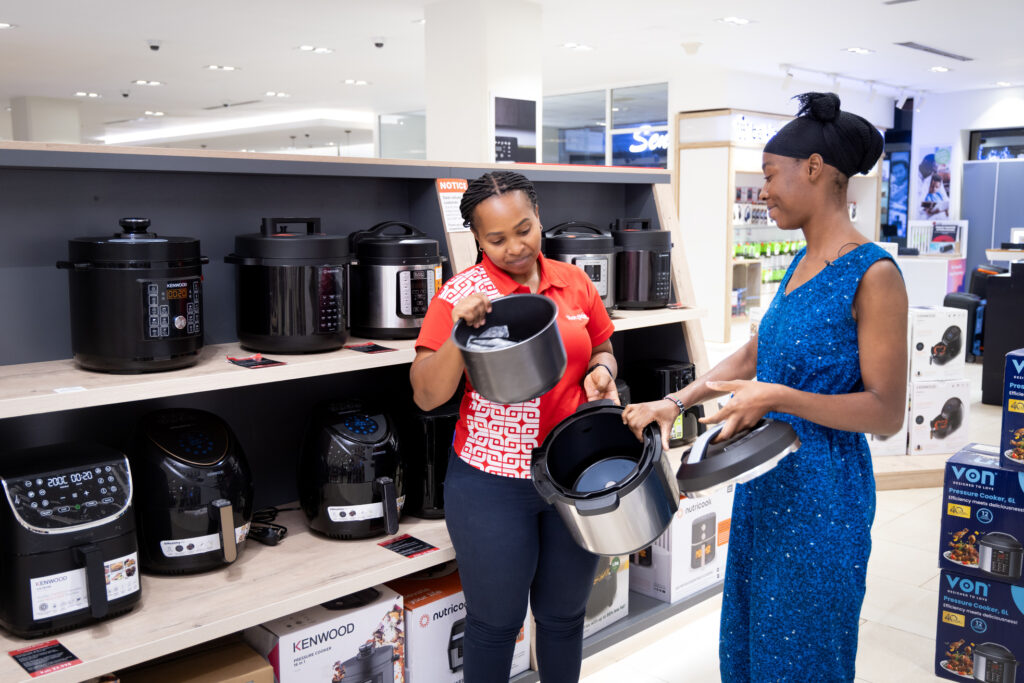
Results-based financing (RBF)
Under an RBF agreement, a funder like EnDev releases funds to a partner when certain agreed-upon results are reached and independently verified. This may, for example, be a specified number of people gaining access to a technology. The partner doing the work decides how best to get the results and unlock the funding. EnDev has successfully used RBFs in many countries since 2013.
“Is this not too fancy for rural women?”
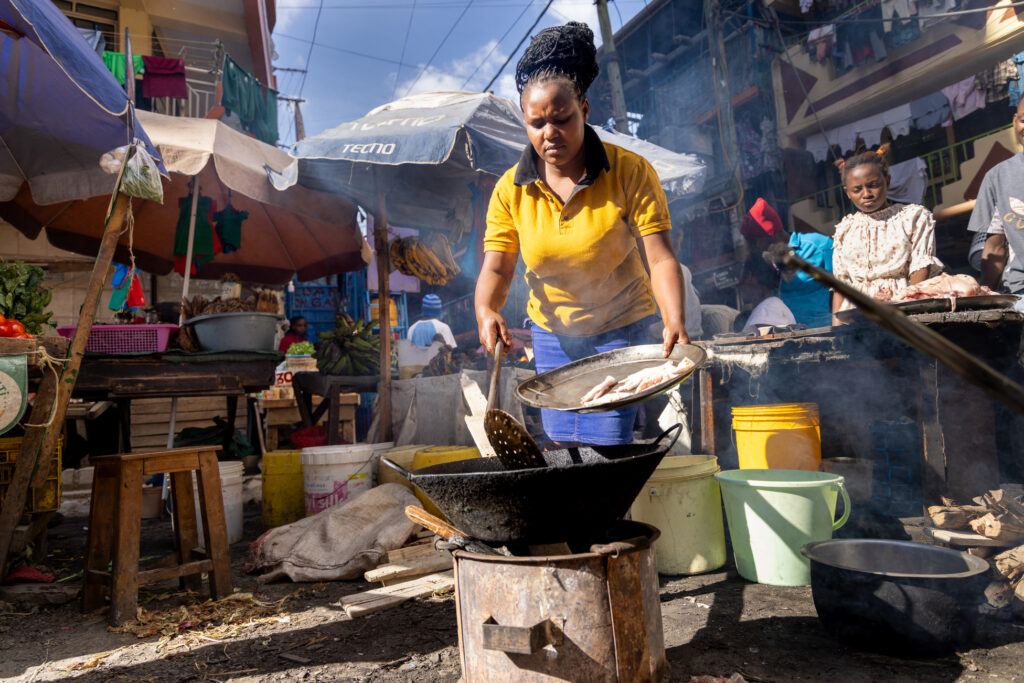
When EnDev started the RBF, almost no households cooked using electricity. Some 85% of Kenyans used wood and charcoal, burning 8–11 million tonnes of biomass every year, and releasing five times as much carbon into the air as all the traffic on the country’s roads. Many believed electricity was too expensive and not reliable enough to cook with, even if efficient electric cookers save money in the long run and reliability was improving fast. And an electric pressure cooker only cooked one dish at a time, while typical Kenyan meals involved two or three dishes. Electric cookers thus had the reputation of being urban kitchen luxuries. Or as customers asked one company: “Is this not too fancy for rural women?”
But some people’s views were already changing. While COVID-19 brought disruptions for companies, lockdown actually sparked demand for eCooking. As people spent more time in their homes, they prioritised better cooking options, and interest was awakened.
EnDev has continued pursuing the emergent eCooking market in rural and displacement settings, launching a second RBF programme in 2023. Companies are providing credit or working with microlenders to make eCooking affordable. And some are offering induction plates alongside electric pressure cookers to solve the one-dish problem. All are pieces of a puzzle that is, however, national in size.
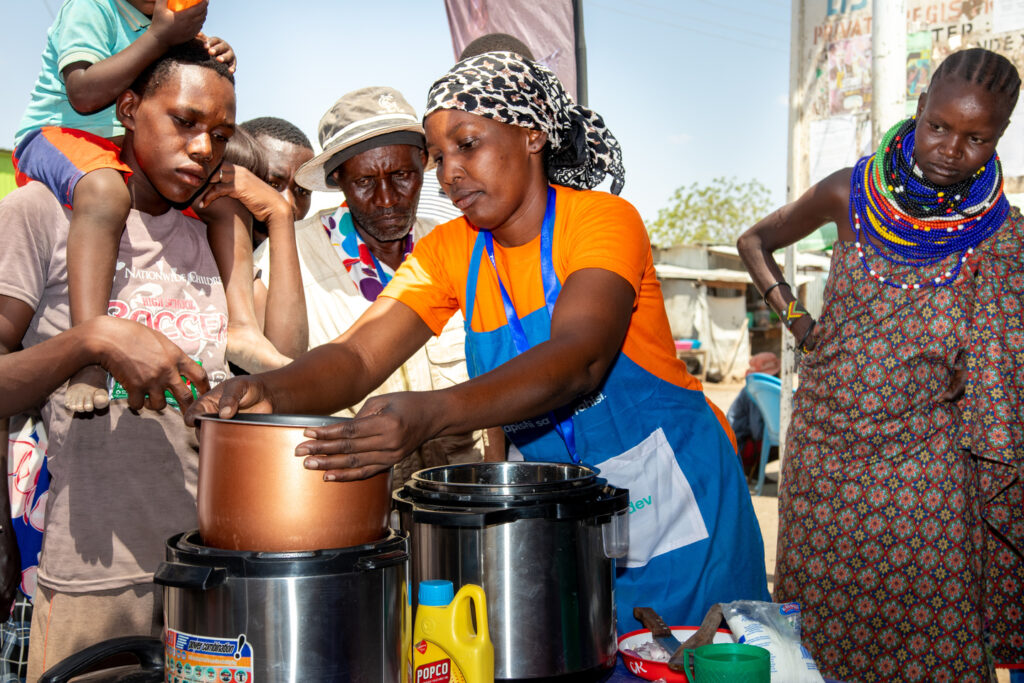
Global electric Cooking Coalition (GeCCo)
Reaching at least 10% of the population in 10 countries – this is the initial target of GeCCo. The coalition launched at the climate conference COP28 in 2023, through the efforts of Modern Energy Cooking Services (MECS), Sustainable Energy for All (SE4All), the Global Energy Alliance for People and Planet (GEAPP), and EnDev. GeCCo Country Action Groups take on responsibility for national coordination and alignment in the transition to eCooking.
To address the big picture, Kenya’s Ministry of Energy and Petroleum called for partners to help develop a national strategy. EnDev, with its experiences and history of technical assistance, training, and cookstove testing with the Ministry, was one clear facilitator. Another was MECS, EnDev’s partner in the Global electric Cooking Coalition (GeCCo), who took the lead in the strategy development. EnDev brought sector actors together, joined the Technical Working Group, and stayed closely involved up to the launch of the National Cooking Transition Strategy and National Electric Cooking Strategy in 2024. Kenya now has a coordinated approach – and ambition. It aims for 10% of households to use eCooking by 2030.
To reach this goal, the Ministry is looking at the two factors EnDev has tackled for years: awareness and affordability. The Kenyan private sector is driving awareness and innovation with support from regional eCooking hubs. For example, one company has introduced an induction stove with real-time monitoring for carbon credits; another has distributed 4,000 electric pressure cookers and helped the manufacturer refine its design for Kenyan kitchens. Affordability, on the other hand, is a complex effort that depends on the price of electricity. The national utility Kenya Power (KPLC) has asked EnDev to support experiments to test reduced eCooking tariffs, and explore commercially viable and affordable models, now piloted with 2,000 households.
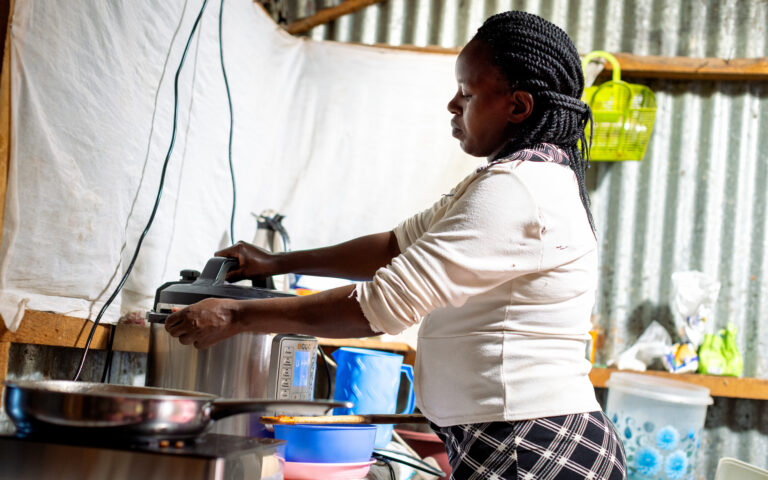
eCooking hubs
Regional hubs are part of Kenya’s clean cooking strategy and the Ministry of Energy and Petroleum’s coordination with other stakeholders, including Modern Energy Cooking Services (MECS) and EnDev. According to the strategy, eCooking hubs in Kakamega, Kisumu, Kitui, Makueni, and Nakuru will “support retailers by promoting the eCooking agenda locally and fostering the development of context-relevant business models, financing mechanisms, and favourable local policies.”
From wood and charcoal to the highest tier of clean cooking, eCooking is a leap into the future for Kenyan cooks. It will take coordination and strategy at a high level – which is now in place, just a few busy years after EnDev began its eCooking work. Three groups are leading the way hand in hand: the private sector with its innovations, political partners with their commitment to establish political framework and an enabling environment, and EnDev with its cross-country experience. Working as a facilitator and promoter, EnDev has helped build a strategic framework for success and put Kenya on another technological forefront.
Key take-aways
Position eCooking as a policy priority
Consider eCooking as a policy area for countries that are making progress in electrification – they can leverage that success for clean cooking progress, too.
Integrate into national strategies
eCooking should be embedded in national energy plans and policies
Change eCooking’s image through multiple partner
Bring all partners, public, and private, and civil society into the task of raising awareness and changing eCooking’s image.
Enhance attractiveness
Look for policy directions that can make eCooking not just affordable, but highly attractive..
